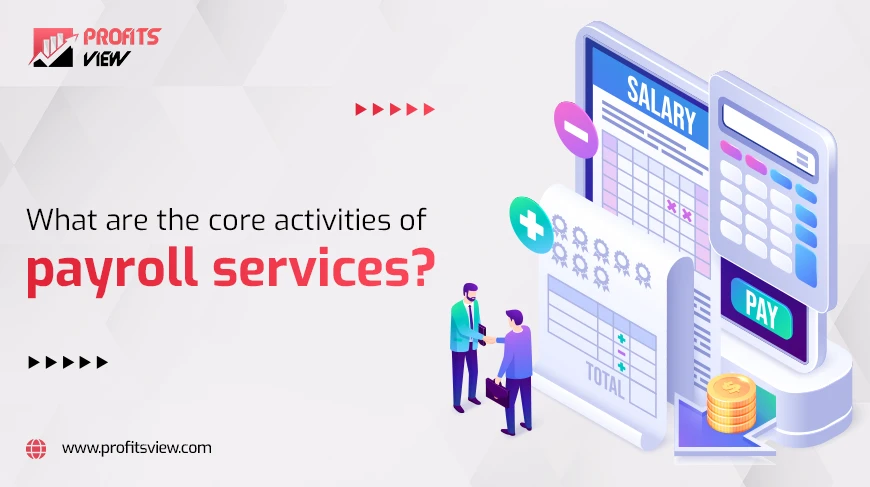Any business needs payroll management to make sure that workers are paid correctly and on schedule. Even though it might appear simple, it can be a difficult and time-consuming task, especially for larger businesses. Payroll services become useful in this situation. They provide a variety of services and solutions that simplify the payroll procedure and free up companies’ time for their primary business needs. We will examine the fundamental tasks performed by payroll services in this blog and how they help businesses run more smoothly and successfully.
Employee Data Management
Keeping track of employee data is one of payroll services’ core functions. This involves gathering and keeping track of vital data, including the names, addresses, Social Security numbers, bank account information, and withholding details of employees. The foundation for exact payroll processing is provided by these data.
Time and Attendance Tracking
Precise monitoring of time and attendance is essential for figuring out employee pay. Payroll services frequently provide tools or software integration with time-tracking software to assist in keeping track of employees’ work hours, overtime, and vacation time. Accurate salary, hourly pay, and benefit calculations depend on this data.
Salary and Wage Calculation
Payroll calculations can be complicated, particularly when deducting overtime and bonuses. Payroll services use this information to calculate each employee’s gross pay, making sure that all calculations follow business and labor regulations.
Tax Deductions and Withholding

The intricacies of payroll include withholding and tax deductions. Payroll services are in charge of taking out Social Security and Medicare contributions, as well as federal, state, and local income taxes, from employees’ paychecks. In addition, they manage tax filings, guaranteeing that companies follow to legal rules and regulations.
Benefit Administration
Many employees have the right to a range of benefits, including flexible spending accounts, retirement plans, and health insurance. Payroll services supervise these benefits by taking the proper amounts out of employees’ paychecks and, in certain situations, making contributions on the employer’s behalf. They also make sure that the employee’s choices and eligibility are respected for these deductions.
Direct Deposits and Payroll Distribution
Payroll services enable employees to receive their salary electronically by facilitating direct deposits. This simplifies the payroll distribution method and does away with the need for paper checks. These services meet the various needs of employees by providing flexibility with regard to payment methods.
Compliance and Reporting
For businesses, following labor and tax laws is essential. Payroll services are in charge of creating and submitting various reports to the relevant government agencies, including W-2s and 1099s. By doing this, companies are protected from fines and legal costs resulting from incomplete or incorrect filings.
Record Keeping
Maintaining accurate records is necessary for compliance and audits. Payroll services keep thorough records of employee information, tax filings, and payroll transactions. In the event of any disagreements, legal questions, or discrepancies, this documentation is essential.
Employee Self-Service Portals

Self-service portals are becoming more and more common in modern workplaces. These portals are frequently offered by payroll services, allowing staff members to view their pay stubs, tax records, and benefit details. Employee empowerment and administrative load reduction for HR departments are both facilitated by this self-service feature.
Year-End Processing
Year-end processing at the end of every fiscal year depends heavily on payroll services. This involves creating W-2 forms, balancing year-to-date totals, and making sure tax laws are followed. Without payroll services, year-end processing is a difficult task that can cause businesses a lot of headaches.
Support and Customer Service
Effective payroll services offer ongoing assistance and client support. Companies can get in touch if they have any questions about payroll, technical difficulties, or other concerns. The smooth operation of payroll procedures is ensured by this continuous support.
Integration with Accounting Systems
The payroll and financial records of a company are closely related. In order to guarantee that payroll data is consistent with the overall financial picture, payroll services frequently integrate seamlessly with accounting systems. This integration lowers the possibility of mistakes and saves time.
Conclusion
Payroll services are essential for companies of all sizes, to sum up. They manage a variety of essential tasks that are necessary for a business to run efficiently. These services relieve companies of the headaches and responsibilities related to payroll processing, from maintaining employee data to guaranteeing tax compliance.
Payroll tasks can be outsourced to professionals to help organizations save time, cut down on errors, and boost productivity. Payroll services improve employee satisfaction by streamlining the payment process, providing timely and accurate pay, and enabling self-service portals. They also allow companies to concentrate on their main functions and long-term objectives.
Payroll services continue to be a vital resource in the dynamic world of business operations, guaranteeing that workers receive just compensation and that companies meet constantly changing labor and tax laws.

